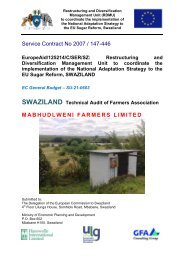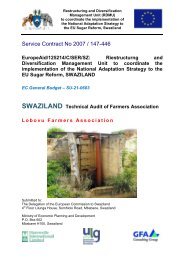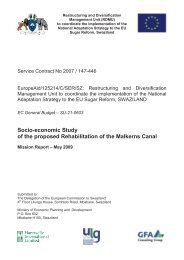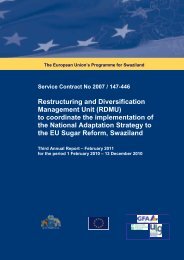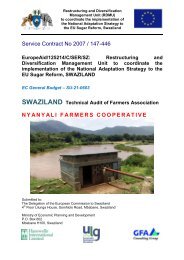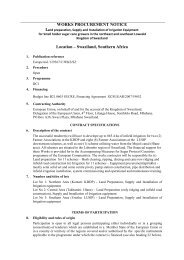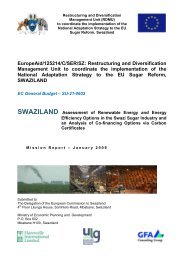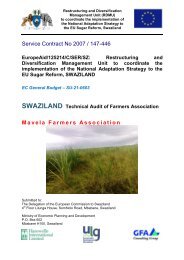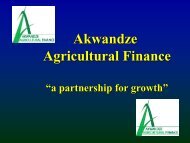Service Contract No 2007 / 147-446 Strategic ... - Swaziland
Service Contract No 2007 / 147-446 Strategic ... - Swaziland
Service Contract No 2007 / 147-446 Strategic ... - Swaziland
- No tags were found...
You also want an ePaper? Increase the reach of your titles
YUMPU automatically turns print PDFs into web optimized ePapers that Google loves.
Policy, Plan orProgrammeComprehensive AfricaAgriculture DevelopmentProgramme (CAADP)National Irrigation Policy(draft) (2005)National Energy Policy(2002)Description / relevance to the NASThe Comprehensive Africa Agriculture Development Programme(CAADP) of the New Partnership for Africa’s Development (NEPAD)provides a framework for restoring agricultural growth, rural developmentand food security in the African region.The CAADP seeks to revitalize the agricultural sector through specialpolicies and strategies targeted at small scale and traditional farmers inrural areas and the creation of enabling conditions for private sectorparticipation, with emphasis on human capacity development and theremoval of constraints to agricultural production and marketing, includingloss of soil fertility, poor water management, inadequate infrastructure,and pests and diseases.The <strong>Swaziland</strong> CAADP is divided into five pillars of activities: (1)expansion of area under sustainable land management and reliable watercontrol systems; (2) improvement of rural infrastructure and trade–relatedcapacities for improved market access; (3) enhancement of food supplyand reduction of hunger (including emphasis on emergencies anddisasters that require food and agricultural responses); (4) developmentof agricultural research, technological dissemination and adoption tosustain long–term productivity growth; and (5) livestock, fisheries andforestry.In March 2010 <strong>Swaziland</strong> officially signed up to the CAADP principles andwill develop interventions designed around the five pillars.Through the implementation of the NAS, elements of CAADP activitiesare already included and with additional resources, NAS measuresaround research, food supply and improvement of rural infrastructurecould be enhanced.The overall goal of the 2005 draft National Irrigation Policy is to ensurethat the irrigated agriculture sub-sector in <strong>Swaziland</strong> contributes fully toeconomic growth and poverty alleviation in accordance with nationaldevelopment goals, the Water Act of 2003 and the need to use thecountry’s limited natural resources in a sustainable fashion. There arethree specific objectives: (1) to optimize the productivity of water in thecountry’s agricultural sector and broaden the scope for agriculturalintensification and diversification; (2) to establish an irrigation sectorinstitutional landscape characterised by transparent regulation and strong,participatory and/or responsive and accountable institutions in <strong>Swaziland</strong>;(3) to enhance the structure of the irrigated sub-sector by promoting newpublic and private investment opportunities for emerging farmers.Through the implementation of the NAS measures, particularly thoserelating to improved irrigation infrastructure, the core policy objectives arebeing met.The Energy Policy was developed to address the challenges of thetransformation of the energy sector and the overall development of thecountry. Its key objectives are: (a) ensuring access to energy for all; (b)enhancing employment creation; (c) ensuring security of energy supply;(d) stimulating economic growth and development; and (e) ensuringenvironmental and health sustainability. This policy is relevant to the NASin two main ways: (1) the cost of energy is a major concern to secure theviability of smallholder cane farmers; and (2) the NAS promotesincreasing co-generation at the sugar mills and the selling of surplusenergy to the national power grid.RDMU (<strong>Strategic</strong> Environmental Assessment of the National Adaptation Strategy) - Page 160



